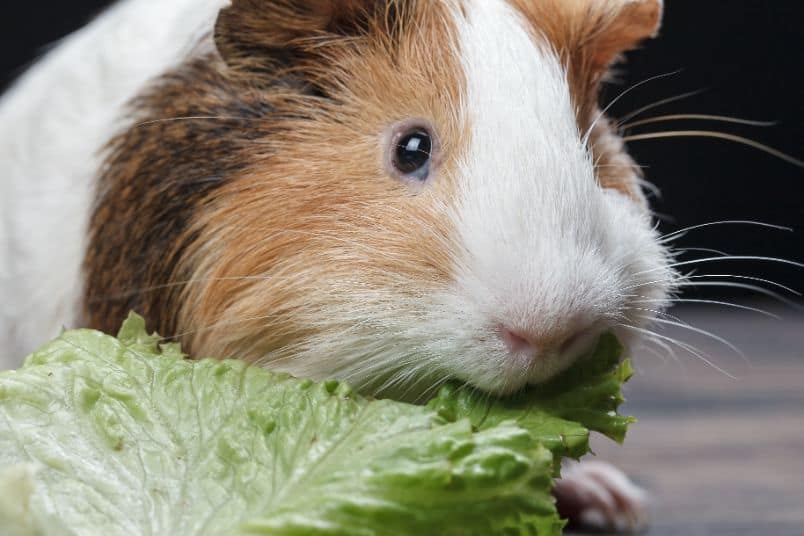I frequently get asked about the best diet for domesticated guinea pigs. However, it’s important to first understand their natural diet in the wild.
Guinea pigs are herbivores, and their diet is primarily composed of grasses, herbs, and leafy greens. They are native to the Andes region of South America, where they live in rocky areas and grasslands. Understanding their wild diet is crucial for providing proper nutrition to domesticated guinea pigs.

What Do Wild Guinea Pigs Eat?
In the wild, guinea pigs have a varied diet that includes grasses, herbs, and leafy greens. They primarily eat a variety of wild grasses, such as fescue, bluegrass, and ryegrass.
They also consume herbs like dandelion, plantain, and clover, as well as leafy greens such as kale and spinach. Interestingly, guinea pigs have the ability to synthesize vitamin C, which is essential for their health, and they can obtain it from their natural diet.
The nutritional value of their diet is high, as it provides them with the necessary vitamins, minerals, and fiber. The high fiber content is especially important, as it helps maintain their digestive health.
Their wild diet differs significantly from that of domesticated guinea pigs, which are often fed commercial pellets that do not provide the same nutritional value as a natural diet.
Factors Affecting Their Diet
The diet of wild guinea pigs is influenced by various factors, including climate and seasonality, availability of food, competition from other animals, and human activities. In the Andes region, the climate is cool and dry, which limits the types of vegetation that can grow.
During the dry season, guinea pigs may have to rely on stored food sources, such as roots and tubers. Additionally, competition for food from other animals, such as rabbits and rodents, can impact their diet.
Human activities can also affect the diet of wild guinea pigs. For example, the use of pesticides and herbicides can reduce the availability of food sources.
Urbanization and land development can also impact their habitat and food sources, leading to a reduction in the diversity of their diet.
How Domesticated Guinea Pigs’ Diet Affects Their Health
Domesticated guinea pigs have specific nutritional needs that differ from those of their wild counterparts. They require a diet that is high in fiber and vitamin C, with limited amounts of fat and sugar. An improper diet can lead to various health issues, such as dental problems, digestive issues, and obesity.
Comparing the diet of wild and domesticated guinea pigs, it’s clear that the latter is often lacking in nutritional value. Commercial pellet diets may not provide the necessary fiber and vitamin C, and they can also be high in fat and sugar.
It’s important for pet owners to ensure that their guinea pigs are getting a balanced diet that meets their nutritional needs.
Feeding Your Pet Guinea Pig a Wild-Inspired Diet
To replicate a wild-inspired diet for domesticated guinea pigs, it’s important to provide a variety of hay, fresh greens, and vegetables. Hay should be the main component of their diet, as it provides essential fiber.
Fresh greens, such as kale, spinach, and parsley, can be given in moderation to provide additional nutrients. Vegetables, such as bell peppers, carrots, and cucumbers, can be given as treats in small amounts.
It’s important to ensure that the diet is balanced and meets the nutritional needs of the guinea pig. Pellets can be given in moderation, but they should not be the main component of their diet. Additionally, fresh water should always be available to ensure proper hydration.
Conclusion
Understanding the natural diet of guinea pigs is essential for providing proper nutrition to domesticated guinea pigs. Their wild diet is composed of a variety of grasses, herbs, and leafy greens, which provide essential vitamins, minerals, and fiber. Factors such as climate, competition, and human activities can impact their diet in the wild.
Feeding domesticated guinea pigs a wild-inspired diet can help ensure that they receive the necessary nutrients for optimal health. A balanced diet that includes hay, fresh greens, and vegetables, with limited amounts of pellets, can help prevent health issues and promote digestive health. I recommend that pet owners consult with their veterinarian to ensure that their guinea pigs’ diet meets their nutritional needs.
Future research is needed to further understand the diet of wild guinea pigs and to develop conservation strategies for their populations.
- How Long Do American Eskimo Dogs Live? Important Factors and Care Tips - September 29, 2023
- Do American Bulldogs Need Grooming? Essential Tips and Care Guidelines - September 29, 2023
- Do Bengal Cats Enjoy Playing? Essential Tips for Keeping Them Active - September 29, 2023